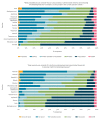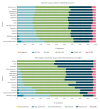Knowledge, attitudes and beliefs about vaccination in primary healthcare workers involved in the administration of systematic childhood vaccines, Barcelona, 2016/17
- PMID: 30755298
- PMCID: PMC6373069
- DOI: 10.2807/1560-7917.ES.2019.24.6.1800117
Knowledge, attitudes and beliefs about vaccination in primary healthcare workers involved in the administration of systematic childhood vaccines, Barcelona, 2016/17
Abstract
BackgroundHealthcare professionals are a reliable and impactful source of information on vaccination for parents and children.ObjectivesWe aimed to describe the knowledge, attitudes and beliefs primary care professionals involved in administration of childhood vaccines in Barcelona have about vaccines and vaccination.MethodsIn 2016/17, surveys were administered in person to every public primary care centre (PCC) with a paediatrics department (n = 41). Paediatricians and paediatric nurses responded to questions about disease susceptibility, severity, vaccine effectiveness, vaccine safety, confidence in organisations, key immunisation beliefs, and how they vaccinate or would vaccinate their own children. We used standard descriptive analysis to examine the distribution of key outcome and predictor variables and performed bivariate and multivariate analysis.ResultsCompleted surveys were returned by 277 (81%) of 342 eligible participants. A quarter of the respondents reported doubts about at least one vaccine in the recommended childhood vaccination calendar. Those with vaccine doubts chose the response option 'vaccine-hesitant' for every single key vaccine belief, knowledge and social norm. Specific vaccine knowledge was lacking in up to 40% of respondents and responses regarding the human papilloma virus vaccine were associated with the highest degree of doubt. Being a nurse a risk factor for having vaccine doubts (adjusted odds ratio (ORa) = 2.0; 95% confidence interval (95% CI): 1.1-3.7) and having children was a predictor of lower risk (ORa = 0.5; 95% CI: 0.2-0.9).ConclusionsDespite high reported childhood immunisation rates in Barcelona, paediatricians and paediatric nurses in PCC had vaccine doubts, especially regarding the HPV vaccine.
Keywords: healthcare workers; infectious diseases; primary care; questionnaire; vaccine hesitancy; vaccine preventable diseases; vaccines.
Conflict of interest statement
Figures




References
-
- World Health Organization Regional Office for Europe (WHO/Europe). Europe observes a 4-fold increase in measles cases in 2017 compared to previous year. Copenhagen: WHO/Europe; 2018. Available from: http://www.euro.who.int/en/media-centre/sections/press-releases/2018/eur...
-
- European Centre for Diseases Prevention and Control (ECDC). Measles cases in the EU treble in 2017, outbreaks still ongoing. Stockholm: ECDC; 2018. Available from: https://ecdc.europa.eu/en/news-events/measles-cases-eu-treble-2017-outbr...
-
- Agència de Salut Pública de Catalunya. [Public Health Agency of Catalonia]. Actualització de casos de xarampió a Barcelona i àrea metropolitana. [Update of measles cases in Barcelona and the metropolitan area]. Barcelona: Public Health Agency of Catalonia; 2017. Catalan. Available from: http://canalsalut.gencat.cat/ca/inici/nota-premsa/?id=298192
Publication types
MeSH terms
Substances
LinkOut - more resources
Full Text Sources
Medical
